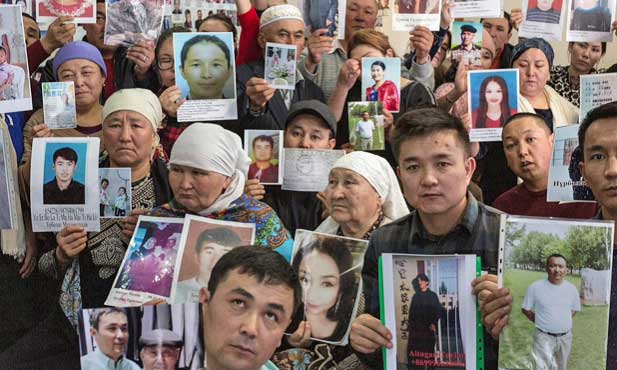JULIET SAMUEL
The Telegraph 22 FEBRUARY 2020

One option on the cocktail list jumped out at me. It was called the “Xinjiang”. For a while, I couldn’t actually register the ingredients. All I could think of, when I saw the name of China’s western-most province, was Beijing’s imprisonment of more than 1 million of its people in “re-education” camps, where they are tortured, raped, forcibly used for medical testing and organ harvesting, and made to recite their “crimes” and extoll the virtues of the Chinese Communist Party.
Back to the menu. The “Xinjiang” was a gin-based concoction with plum, ginger and cumin. A complementary dish, a “Uighur burger”, consisted of pulled lamb in a soft, Chinese bun. “They are Muslim in Xinjiang, so they eat a lot of lamb,” said the waitress.
I wanted to mention that that the Koran is now banned in Xinjiang and that prison inmates are forced to eat pork. To be fair, it was possible she already knew. Many Chinese restaurants abroad are started by the diaspora, who are often not huge fans of Xi Jinping’s regime.
I couldn’t decide. Was the menu a grotesque, Potemkin-esque gloss on a region and a people being systematically subjugated? Or was it a small way of celebrating a culture that is being annihilated? Minus the gin.
There are a fair number of Uighurs in London trying to get their stories out. Some months ago I met one called Aziz Isa Elkun, a man possessed of a quiet, firm dignity, with family still trapped in Xinjiang.
His sister was put in a camp for a year. Via Google Maps, he has discovered that his father’s grave has been destroyed. And now, a BBC report has highlighted that the only time he has been able to see his mother in recent years was via a Chinese TV report aired in January, in which she gave a forced confession and condemned him.
In a sign of how our system is utterly failing to filter China’s propaganda onslaught, the CGTN report was freely broadcast in this country, only afterwards prompting an Ofcom investigation.
There used to be a time, some years ago, when it was barely possible to talk about China without mentioning “human rights record” in the next breath. (Incidentally, the regime of repression used in Xinjiang was road-tested in Tibet.)
But now, the name that should most rain down shame and ignominy on the Chinese Communist Party is so anonymous that it’s made into a cocktail. The party propaganda machine is doing its job magnificently.
It may not help, as you drive around in vain looking for passable lanes or, God forbid, wait for waters to recede from your living room, to know that the weather system behind the floods has a rather wonderful name. The likely culprit is a mega “atmospheric river” – a massive flow of vapour, low in the atmosphere – a US scientist has told the FT. The term, only categorised by the American Meteorological Society in 2017, is surely due some wider appreciation.
An “atmospheric river” is not, as you might imagine, a broad, misty watercourse dotted with herons and punts. It is defined, officially, as “a long, narrow, and transient corridor of strong horizontal water vapour transport”. Read the full article from the Telegraph:
www.telegraph.co.uk/news/2020/02/22/must-not-forgot-xinjiang-horrors-committed/
